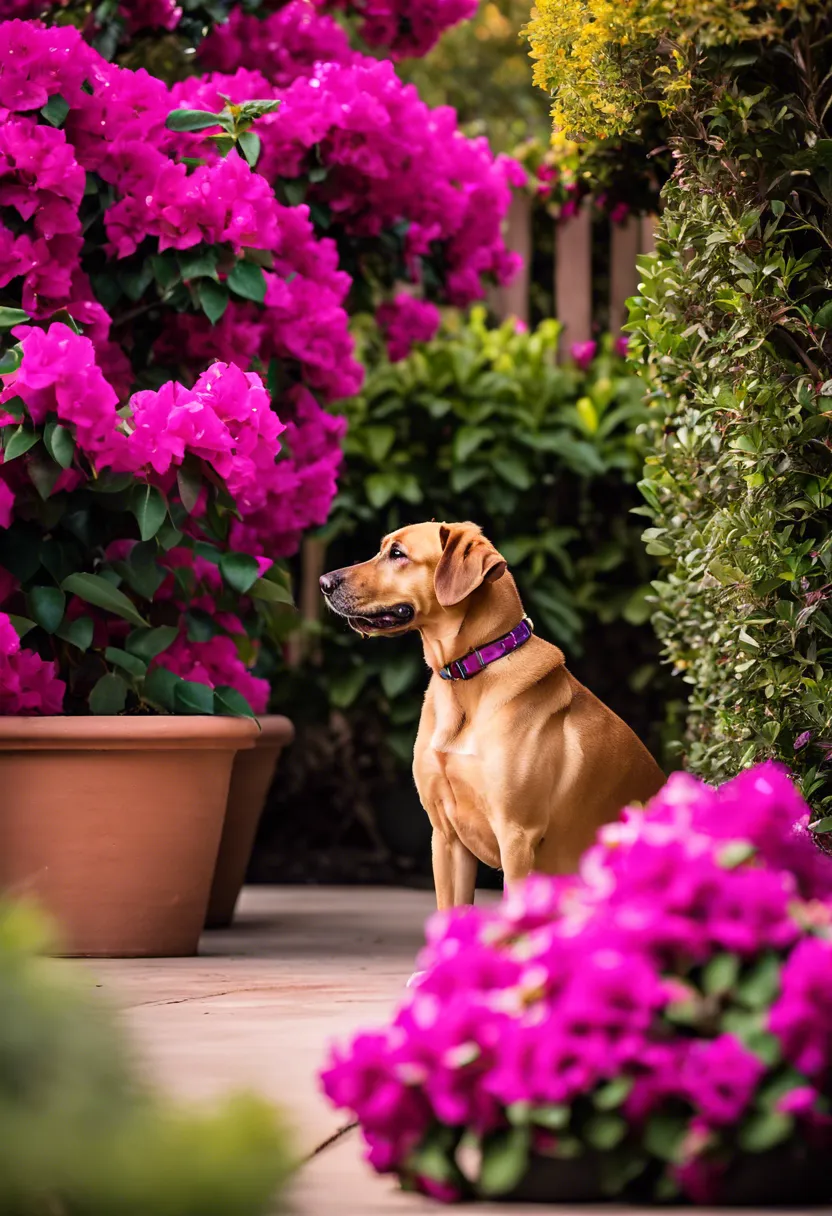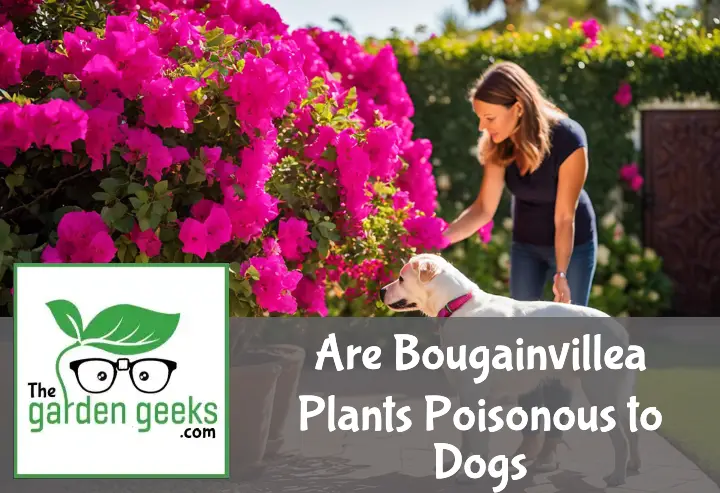Did you know that over 67% of U.S households, or about 85 million families, own a pet? And among these pets, dogs are the most common. Now, imagine your beloved furry friend playing in the garden, sniffing and chewing on plants. Suddenly, they come across a vibrant Bougainvillea plant. You might wonder, Are Bougainvillea Plants Poisonous to Dogs?
Well, let’s delve into this colorful world of Bougainvilleas and understand their impact on our canine companions. We’ll explore whether these tropical beauties pose any threat to our four-legged friends.
So buckle up and keep reading about ‘Are Bougainvillea Plants Poisonous to Dogs’ as we take you through an enlightening journey about dog safety around these lovely flowering plants.
Quick Answer
- Yes, Bougainvillea plants are poisonous to dogs.
- The toxicity comes from the plant’s sap which contains compounds that can cause vomiting, diarrhea, and skin irritation in dogs.
- If your dog ingests Bougainvillea, look for symptoms like drooling, pawing at the mouth or face, vomiting, and diarrhea.
- To prevent your dog from eating these plants, use training techniques and safe gardening practices.
- If your dog does eat Bougainvillea, contact a vet immediately.
- Consider planting alternative non-toxic plants in your garden to keep your furry friend safe.

Are Bougainvillea Plants Toxic to Dogs?
Understanding the Toxicity of Bougainvillea
When it comes to Bougainvillea toxicity, many dog owners scratch their heads. Is this vibrant plant a danger to our furry friends? Well, let’s dive into that. First off, Bougainvillea plants are not the villain in your garden. They’re not known to be deadly toxic to dogs. But, and it’s a big but, they’re not exactly a bowl of dog chow either.
The main issue lies in the plant’s thorns. These pointy parts can hurt your dog if they decide to take a bite or just play around with it. Imagine chewing on something prickly. Ouch, right? That’s how your pup feels.
Now, about the actual toxic elements in bougainvillea—it’s complicated. The plant itself isn’t packed with poison waiting to wreak havoc on your dog’s health. However, if Fido eats enough of those leaves and flowers, they might end up with an upset stomach.
Why is this? It boils down to the plant being foreign to their digestive system. Dogs are curious creatures and sometimes eat things they shouldn’t. If they munch on bougainvillea, their body might react by saying, “Nope, don’t like that,” leading to vomiting or diarrhea.
So, while bougainvillea isn’t the most dangerous plant out there for dogs, it’s best kept at a paw’s length away from them. This way, you avoid any potential dog health risks and keep your garden a safe playground for them.
Symptoms of Poisoning in Dogs After Ingesting Bougainvillea
If you catch your dog snacking on some bougainvillea, keep an eye out for signs of discomfort. The first things you might notice are drooling more than usual or making faces like they ate something bitter.
Next up could be vomiting or diarrhea—neither fun for you nor your pup. These symptoms show their body is trying to get rid of something it doesn’t like.
Another sign is if they start acting weirdly tired or just not themselves—like if all they want to do is lie down when usually they’re zooming around everywhere.
If you see any of these signs after your dog has had a run-in with bougainvillea, it’s time for action! First off, don’t panic; remember that serious cases are rare but being cautious never hurt anyone.
The best first step is giving your vet a quick call—they can tell you what to do next based on how Fido is doing. Sometimes they might say watch and wait; other times, they’ll want you to bring them in just to be safe.
In summary: Yes, dogs and bougainvillea can live together happily ever after with a bit of supervision and precautionary measures from pet parents aware of potential hazards posed by these otherwise beautiful plants.
How to Prevent Your Dog from Eating Bougainvillea
Keeping bougainvillea and dogs apart might seem tricky, but it’s doable with the right approach.
Training Techniques to Discourage Eating Plants
Training your dog not to munch on your garden, including bougainvillea, starts with consistency. First off, catch them in the act. A firm “no” can work wonders when you see them eyeing that plant.
Next up, distraction is your best friend. If they go for a plant, offer a toy instead. It’s like swapping out candy for fruit—healthier and safer.
Consider setting up a designated play area away from harmful plants. This way, they learn where their playground is.
Positive reinforcement goes a long way. Reward them for good behavior around plants with treats or extra playtime.
For stubborn cases, professional help might be needed. A dog behavior modification program can tailor solutions specifically for your furry friend.
Lastly, patience is key. Changing behavior takes time but stick with it for a safer garden for your pet.
Safe Gardening Practices to Protect Pets
Creating a pet-safe garden starts with knowing what’s in it. Identify all your plants and remove any that could harm pets.
Fences aren’t just for keeping dogs in; they can keep them out of certain areas too. Consider fencing off sections where you have bougainvillea or other harmful plants.
Another tip is to use raised beds or hanging baskets for potentially dangerous plants. Keeping them out of reach makes it less likely your dog will try to eat them.
Mulching can also deter dogs from digging in areas where they shouldn’t be. Plus, it keeps the garden looking neat!
Lastly, always supervise outdoor playtime as much as possible. Being there lets you steer them away from danger and reinforces training efforts.
By combining these pet-safe gardening tips with consistent training methods, you can create an environment that’s safe and enjoyable for both bougainvillea and dogs alike.



What to Do If Your Dog Eats Bougainvillea


If your furry friend decides that a bougainvillea plant looks like a tasty snack, don’t panic! While bougainvillea isn’t the best treat for them, there are steps you can take to ensure they stay safe and healthy. Let’s walk through what you should do.
-
Identify how much of the plant your dog ate. If it was just a small nibble, they might be okay with little to no reaction. However, if they decided to have a feast, you’ll need to watch them more closely.
-
Observe your dog for any signs of distress such as vomiting, diarrhea, or excessive drooling. These symptoms could indicate that the plant is not sitting well with their stomach.
-
Remove any remaining parts of the plant from your dog’s reach. This might seem obvious, but in the moment, it can be easy to forget!
-
Offer water to help flush out their system. Keeping them hydrated is key if they start showing mild symptoms like an upset stomach.
-
Contact your vet if you notice any severe reactions or if your dog consumed a large amount of the plant. It’s better to be safe and get professional advice on how to proceed.
-
Monitor your dog closely for the next 24 hours even if they seem fine initially. Symptoms can sometimes take time to appear.
-
Prevent future incidents by either removing the bougainvillea plant from areas accessible to your dog or training your pet to stay away from it.
By following these steps, you can ensure that both your dog and your bougainvillea can coexist safely in your home.
Alternative Non-Toxic Plants for Dog Owners
If you’re a dog owner looking to spruce up your home with some greenery without risking your furry friend’s health, you’re in luck! There are plenty of beautiful plants out there that won’t harm your dog if they decide to take a little nibble. Here’s a list of safe options that can brighten up any space:
-
Spider Plant: Not only do these guys look cool with their long, thin leaves and mini “spider” offshoots, but they’re also super easy to care for. Plus, they’re totally safe for dogs. So, if Fido decides it looks like a tasty treat, no worries!
-
Boston Fern: These lush ferns add a nice touch of wilderness to any room and are known for being tough to kill – perfect if you don’t have a green thumb. They’re also completely safe for dogs, making them an excellent choice for pet owners.
-
Areca Palm: Want something a bit more tropical? The Areca Palm is your go-to. It’s not only non-toxic to dogs but also acts as a natural air purifier. Just make sure it gets plenty of light!
-
Bamboo Palm: Another great option for those wanting to add a tropical vibe without the worry. Bamboo Palms are safe for dogs and can grow quite large, making them perfect as statement pieces in your living area.
-
African Violet: If you’re after something with flowers, African Violets are the way to go. These small plants bloom several times a year with lovely purple flowers and are perfectly safe around pets.
-
Orchid: Orchids can bring elegance and color to any space. They’re non-toxic to dogs and come in so many varieties; you’ll surely find one that matches your decor.
-
Polka Dot Plant: For something fun and funky, check out Polka Dot Plants. Their leaves have unique spots and splashes of color ranging from pink to red and white. They’re non-toxic to dogs and can add a pop of color to your home.
Choosing any of these plants will ensure that your home is both stylish and safe for your four-legged friends. Happy decorating!
To Wrap Up
So, we’ve learned that Bougainvillea plants can be harmful to our furry friends. If your dog chews or swallows any part of these plants, they might feel sick.
The best way to keep your pup safe? Keep these colorful plants out of their reach! Remember, it’s always better to be safe than sorry.
In case you want to read more about this topic, check out Are Bougainvillea Plants Poisonous to Dogs. Let’s protect our canine companions together!


FAQs about ‘Are Bougainvillea Plants Poisonous to Dogs?’.
What part of the Bougainvillea plant is toxic to dogs?
The entire Bougainvillea plant, including its leaves, flowers, and stems, can be harmful to dogs if ingested due to its mildly toxic nature.
Are there other plants similar to Bougainvillea that are also poisonous to dogs?
Yes, many plants similar in appearance or family to Bougainvillea like Azaleas, Lilies and Oleander are also toxic to dogs. It’s important for dog owners to research before adding new plants.
What immediate action should I take if my dog has eaten a Bougainvillea plant?
If your dog has ingested any part of a Bougainvillea plant, you should contact your vet immediately. They may instruct you on inducing vomiting or bring the dog in for observation.
How can I train my dog not to eat plants like Bougainvillea?
Training methods include teaching the “leave it” command and positive reinforcement when they avoid the plant. Regular supervision during outdoor time is also crucial.
Are there symptoms I should look out for if my dog has been around a Bougainvillea plant?
Symptoms of poisoning may include vomiting, diarrhea, drooling excessively or showing signs of discomfort. If any of these occur after exposure to a Bougainvillea plant, consult your vet immediately.
Can cats get poisoned by eating bougainvillea too?
Yes, cats can also get poisoned by eating bougainvilleas. The toxicity level is similar as in dogs so it’s best to keep these plants out of reach from all pets.


